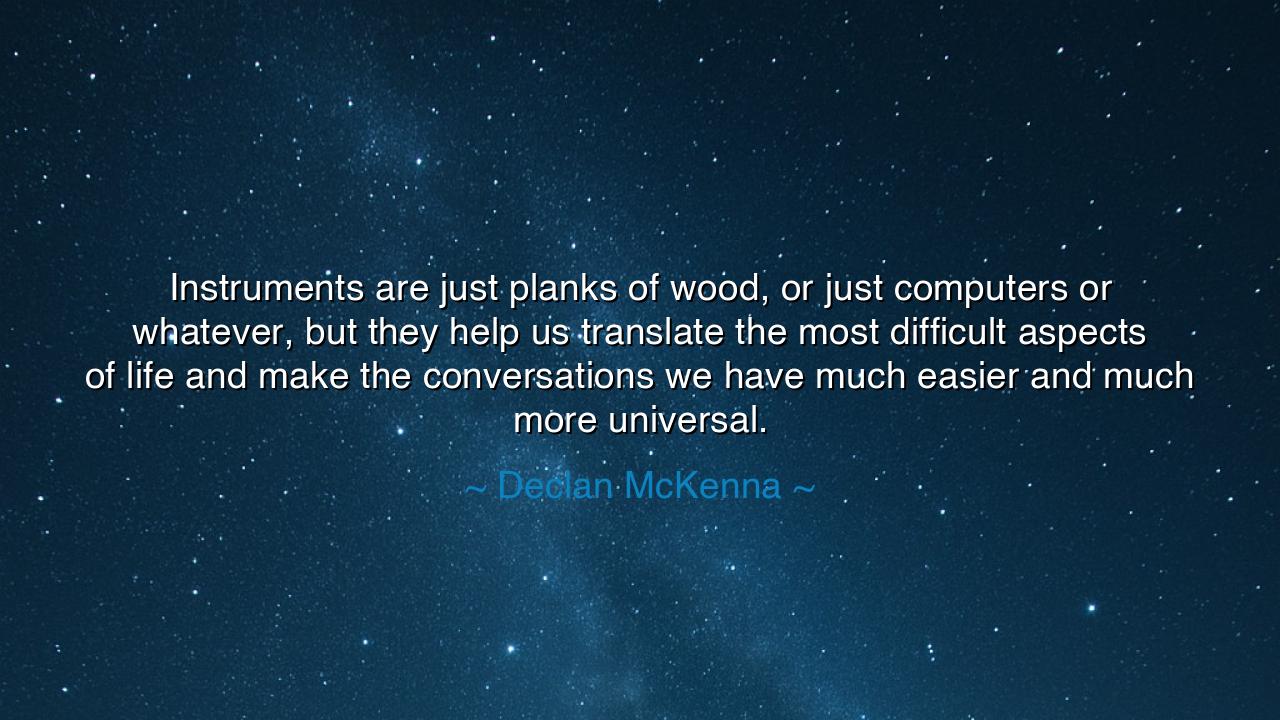
Instruments are just planks of wood, or just computers or
Instruments are just planks of wood, or just computers or whatever, but they help us translate the most difficult aspects of life and make the conversations we have much easier and much more universal.






The words of Declan McKenna — “Instruments are just planks of wood, or just computers or whatever, but they help us translate the most difficult aspects of life and make the conversations we have much easier and much more universal.” — rise like a hymn to the ancient spirit of art itself. His reflection reminds us that music, though born of simple materials, holds the power to express what the human tongue cannot. Beneath his modest tone lies an ageless truth: instruments are not sacred because of their form, but because of the souls that breathe through them. They are vessels — bridges between the visible and the invisible, between thought and feeling, between one human heart and another.
In the days of old, before words were written and empires built, the earliest humans gathered around fire and struck stones, stretched hides, and carved flutes from bone. They discovered that rhythm could echo the heartbeat of the earth and that melody could heal sorrow or summon joy. The ancients knew, as McKenna does, that music is the oldest and purest language of humanity. It speaks where speech fails. It unites those divided by borders or beliefs, and it softens the hardest of hearts. What begins as vibration becomes communion — a shared understanding that transcends reason.
The origin of McKenna’s thought arises from his own journey as a musician in the modern age. Surrounded by technology and instruments crafted from wood, metal, and code, he recognizes that these tools, though lifeless on their own, become sacred when touched by intention. Whether a guitar or a synthesizer, each is merely a tool until animated by emotion. When the artist plays, something divine passes through — a translation of the ineffable. The plank of wood becomes a voice for the soul; the computer becomes an altar where truth is rendered into sound.
This idea has echoed through history. When Ludwig van Beethoven, trapped in the silence of his own deafness, composed his Ninth Symphony, he proved that music was not confined to hearing but born from the depths of being. The instruments he could no longer perceive still carried his spirit into eternity. So too did the African griots, who, with drums and stringed koras, preserved entire histories and lineages through song. And when the sitar of Ravi Shankar or the guitar of Jimi Hendrix cried out before thousands, it was not the wood or the strings that moved the people — it was the human condition itself, made audible.
McKenna’s words remind us that instruments are translators of emotion, not objects of worship. They transform grief into beauty, confusion into clarity, isolation into unity. When we cannot explain loss, we sing it. When we cannot express love, we play it. Through this act, we make life’s “most difficult aspects” understandable, and we find that others, too, have felt what we feel. Thus, music becomes not an escape, but an act of courage — the sharing of vulnerability in a language that all can hear.
In a world fractured by difference, McKenna’s insight carries a moral power. He teaches that art, when sincere, erases barriers. A melody composed in one land can move the hearts of strangers in another. A song written in pain can give strength to the weary oceans away. Music is the great equalizer of existence — it asks for no translation, for its message is woven into the fabric of the human spirit. It makes our conversations “much more universal,” as McKenna says, because it speaks not to the mind but to the essence of who we are.
So, my children, let this truth dwell in you: the power of creation does not lie in the tool, but in the hand that wields it and the heart that guides it. Whatever instrument you hold — be it a guitar, a pen, a brush, or even silence itself — use it to translate what cannot otherwise be said. Let your art be your offering to the world’s understanding. For when you speak through creation, you join the endless chorus of humanity that has sung since time began.
And thus, McKenna’s words echo across generations: that art and music are not luxuries, but necessities — the breath of the spirit in a world too heavy with noise. The instrument is the bridge; the human soul is the traveler. Through that bridge, we cross from isolation into unity, from chaos into peace, and from the fleeting moment into the eternal harmony of all creation.






AAdministratorAdministrator
Welcome, honored guests. Please leave a comment, we will respond soon